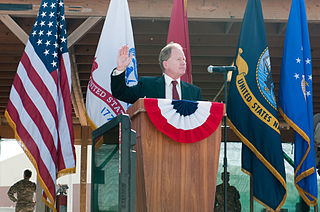
An oath of office is an oath or affirmation a person takes before assuming the duties of an office, usually a position in government or within a religious body, although such oaths are sometimes required of officers of other organizations. Such oaths are often required by the laws of the state, religious body, or other organization before the person may actually exercise the powers of the office or organization. It may be administered at an inauguration, coronation, enthronement, or other ceremony connected with the taking up of office itself, or it may be administered privately. In some cases it may be administered privately and then repeated during a public ceremony.

The Pledge of Allegiance is a patriotic recited verse that promises allegiance to the flag of the United States and the republic of the United States of America. The first version was written in 1885 by Captain George Thatcher Balch, a Union Army officer in the Civil War who later authored a book on how to teach patriotism to children in public schools. In 1892, Francis Bellamy revised Balch's verse as part of a magazine promotion surrounding the World's Columbian Exposition, which celebrated the 400th anniversary of Christopher Columbus' arrival in the Americas. Bellamy, the circulation manager for The Youth's Companion magazine, helped persuade then-president Benjamin Harrison to institute Columbus Day as a national holiday and lobbied Congress for a national school celebration of the day. The magazine sent leaflets containing part of Bellamy's Pledge of Allegiance to schools across the country and on October 21, 1892, over 10,000 children recited the verse together.

An oath of allegiance is an oath whereby a subject or citizen acknowledges a duty of allegiance and swears loyalty to a monarch or a country. In modern republics, oaths are sworn to the country in general, or to the country's constitution. For example, officials in the United States, take an oath of office that includes swearing allegiance to the United States Constitution. However, typically in a constitutional monarchy, such as in the United Kingdom, Australia, and other Commonwealth realms, oaths are sworn to the monarch. Armed forces typically require a military oath.

The monarchy of New Zealand is the constitutional system of government in which a hereditary monarch is the sovereign and head of state of New Zealand. The current monarch, King Charles III, acceded to the throne following the death of his mother, Queen Elizabeth II, on 8 September 2022 in the United Kingdom. The King's elder son, William, Prince of Wales, is the heir apparent.

The Canadian Oath of Allegiance is a promise or declaration of fealty to the Canadian monarch—as personification of the Canadian state and its authority, rather than as an individual person—taken, along with other specific oaths of office, by new occupants of various federal and provincial government offices; members of federal, provincial, and municipal police forces; members of the Canadian Armed Forces; and, in some provinces, all lawyers upon admission to the bar. The Oath of Allegiance also makes up the first portion of the Oath of Citizenship, the taking of which is a requirement of obtaining Canadian nationality.

A loyalty oath is a pledge of allegiance to an organization, institution, or state of which an individual is a member. In the United States, such an oath has often indicated that the affiant has not been a member of a particular organization or organizations mentioned in the oath. The U.S. Supreme Court allows the oath to be a form of legal document.
An oath of citizenship is an oath taken by immigrants that officially naturalizes immigrants into citizens. It is often the final step in this process, and is usually done in a ceremonial capacity. An oath of citizenship is designed to be a statement of patriotism and loyalty to the new country. In countries which retain a monarchical system of government, an oath of allegiance to the monarch is often required as well. Adding an oath to God to the end of an oath is usually optional.

The Oath of Allegiance is a promise to be loyal to the British monarch, and their heirs and successors, sworn by certain public servants in the United Kingdom, and also by newly naturalised subjects in citizenship ceremonies. The current standard wording of the oath of allegiance is set out in the Promissory Oaths Act 1868.

The Oath of Citizenship, or Citizenship Oath, is a statement recited and signed by those who apply to become citizens of Canada. Administered at a ceremony presided over by a designated official, the oath is a promise or declaration of fealty to the Canadian monarch and a promise to abide by Canada's laws and uphold the duties of a Canadian citizen; upon signing the oath, citizenship is granted to the applicant.

The Oath of Allegiance of the United States is the official oath of allegiance that must be taken and subscribed by every immigrant who wishes to become a United States citizen.

New Zealand nationality law details the conditions by which a person is a national of New Zealand. The primary law governing these requirements is the Citizenship Act 1977, which came into force on 1 January 1978. Regulations apply to the entire Realm of New Zealand, which includes the country of New Zealand itself, the Cook Islands, Niue, Tokelau, and the Ross Dependency.
The Pledge of Allegiance of the United States has been criticized on several grounds. Its use in government funded schools has been the most controversial, as critics contend that a government-sanctioned endorsement of religion violates the Establishment Clause of the First Amendment to the U.S. Constitution. Arguments against the pledge include that the pledge itself is incompatible with democracy and freedom, that it is a form of nationalistic indoctrination, that pledges of allegiance are features of current and former totalitarian states such as Nazi Germany, and that the pledge was written to sell flags.
The New Zealand Oath of Allegiance is defined by the Oaths and Declarations Act 1957. The Oath is required under New Zealand law to be made in certain circumstances, including as a requirement for individuals to hold certain offices, as well in judicial proceedings.
In Australia, an Oath of Allegiance or an Affirmation of Allegiance are oaths of allegiance required to be made to the monarch of Australia in some situations. Oaths of Allegiance are usually made on a Bible, or some other book holy to the person, such as a Torah or Quran; but the person may opt to make an affirmation in lieu of an oath. This oath is not the same as the Australian Citizenship Pledge which is required to be made when being naturalised as an Australian citizen.
Trinidad and Tobago passports are issued to citizens of Trinidad and Tobago for international travel; allowing the passport bearer to travel to foreign countries in accordance to stipulated visa requirements. All Trinidad and Tobago passports are issued through the Ministry of National Security, Immigration Division and are valid for a period of ten years for adults, and five years for children under 16.

The Nationality, Immigration and Asylum Act 2002 is an Act of the Parliament of the United Kingdom. It received royal assent on 7 November 2002.
The Bhutanese Citizenship Act of 1958, officially the Nationality Law of Bhutan, 1958, is a decree by the Druk Gyalpo King Jigme Dorji Wangchuck, recognizing the definition of a Bhutanese citizen. The Act was amended in 1977 and then superseded by the Citizenship Act of 1985.
The Australian citizenship affirmation is a short statement that enables Australian citizens to publicly display their pride in being Australian.
The Oath of Allegiance is an oath administered to and recited by immigrants who wish to accede to the citizenship of the Republic of the Philippines. The current oath, based on the United States Oath of Allegiance, was first enshrined in Commonwealth Act No. 473, the Revised Naturalization Law of 1939, with the modern version enshrined in Republic Act No. 9225, the Citizenship Retention and Re-acquisition Act of 2003.

Teanau Tuiono is a New Zealand politician. In 2020 he became a Member of Parliament in the House of Representatives as a representative of the Green Party of Aotearoa New Zealand.









